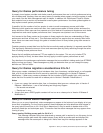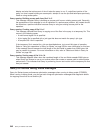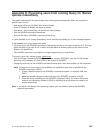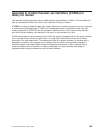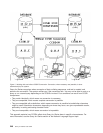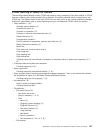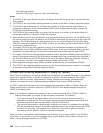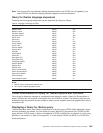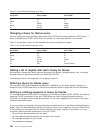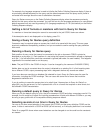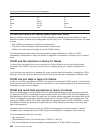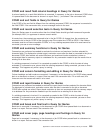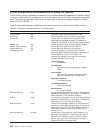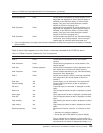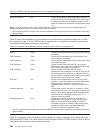
Note: The query profile, user-defined collating sequence default, and CCSID are only updated if you
press F23 from the Define Collating Sequence display to save the sequence.
Query for iSeries language sequences
Following are the language sequences that are supported by Query for iSeries.
Table 9. Language Code-Page CCSIDs
Country or Version Code Page CCSID
Belgian Dutch 00500 500
Belgian French 00500 500
Canadian English 00037 37
Canadian French 00500 500
Danish NLV 00277 277
Dutch NLV 00037 37
Finnish NLV 00278 278
French MNCS 00500 500
French NLV 00297 297
German MNCS 00500 500
German NLV 00273 273
Icelandic 00871 871
Italian MNCS 00500 500
Italian NLV 00280 280
Norwegian NLV 00277 277
Portuguese NLV 00037 0037
Portuguese MNCS 00500 500
Spanish MNCS 00500 500
Spanish NLV 00284 284
Swedish NLV 00278 278
Swiss French MNCS 00500 500
Swiss German MNCS 00500 500
Swiss Italian MNCS 00500 500
United Kingdom 00285 285
United States English 00037 37
Notes:
1. MNCS means multinational character set
2. NLV means national language version
CCSID conversions for Query for iSeries options and functions
You may get a diagnostic message or unexpected result when you select a Query for iSeries option or
press a function key that requires a conversion from one CCSID to another. The following may help you
understand what conversions may be needed to satisfy various requests and what happens when such a
conversion fails.
Displaying a Query for iSeries query
The following table shows how different combinations of job and query CCSIDs affect displaying a query
and how constants are treated. You can display the query definition if the process (job) CCSID and the
query definition CCSID match, if either is marked with a CCSID of 65535 (do not convert), or if the query
definition is not marked. In Table 10 on page 250, 37 is the English CCSID and 65535 is a CCSID that
blocks conversion.
Appendix E. Coded character set identifiers (CCSIDs) in Query for iSeries 249



